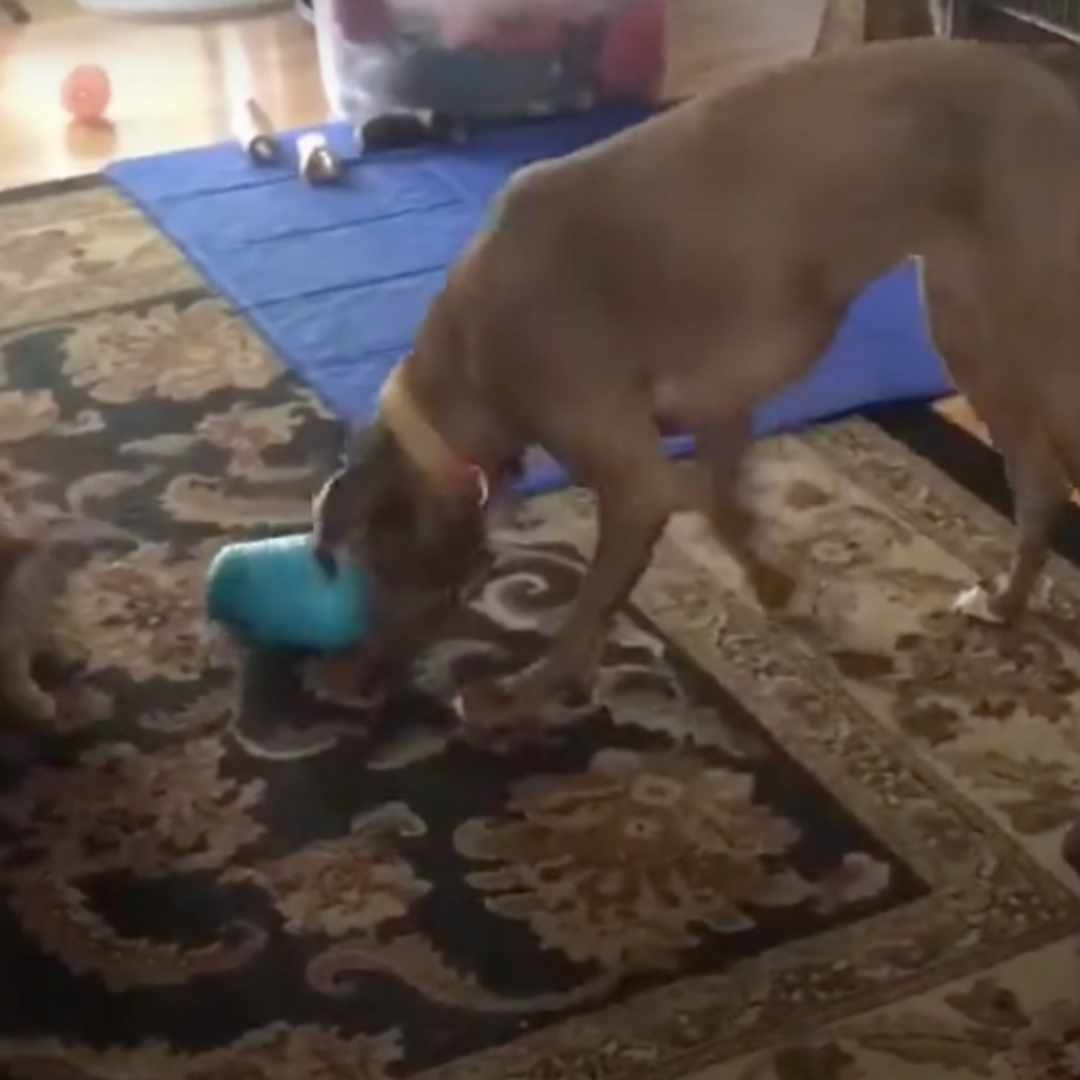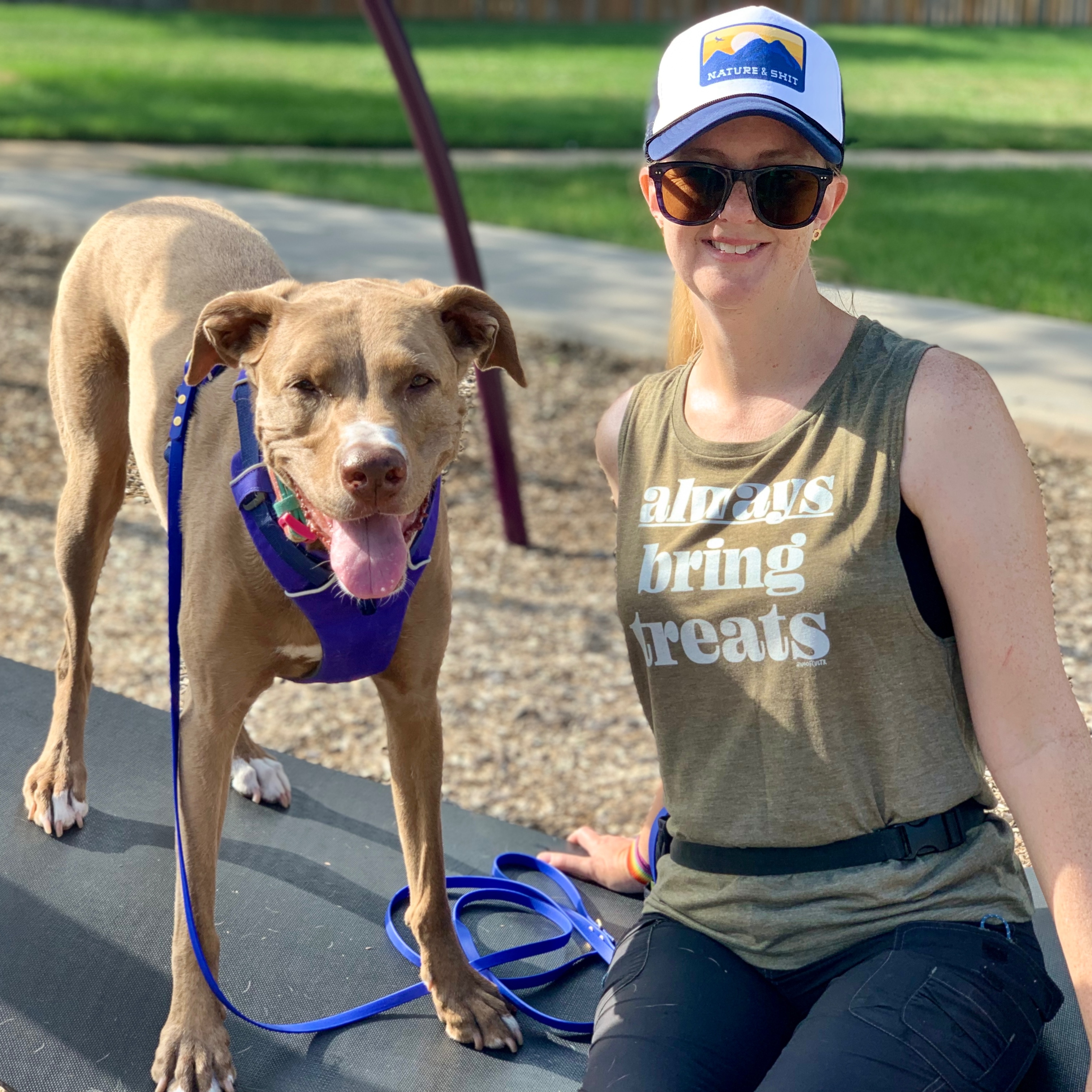For parents of dogs scared of thunder & other loud sounds, here's what you can do to calm your frightened, anxious dog.
All of us who have a dog afraid of booming noises know the dread that comes with the 4th of July - our least favorite holiday when we hunker down inside while our friends are off at BBQ’s and we're hiding with our shaking dog whose heart is racing as careless people set off fireworks night and day.
And many dog parents know the worried anticipation of other loud noises - seeing a thunderstorm in the forecast or a new construction site in the neighborhood. It's heartbreaking and frustrating to see dogs afraid and so thoroughly terrified to the point of extreme physical distress.
But thankfully, there's a lot we can do to prepare and help noise-sensitive dogs become more comfortable and even help change their emotional associations with thundering sounds.
Here are tips to help you prepare for fireworks large or small, thunderstorms, construction noises, or other overwhelming sounds.
Luckily, most of the same protocols and steps can be taken for every loud noise!
Your Dog's Plan
Stop! Don't read this long article. Instead, get everything you need to know, including all advice on Noise Sensitivity, in a customizable step-by-step plan for your dog created by our community of certified trainers and nutritionists.
Make sure your dog has ID
More dogs are lost on the 4th of July than any other day of the year. Every year. While lost dogs peak on the 4th due to the flight response triggered by relentless booms, you never know when a neighbor will randomly decide it's time for a firecracker or a sudden thunderstorm will pop up.
It's important your dog is always wearing up-to-date identification tags just in case. Consider having ID on when in your yard as well just in case your dog gets spooked and slips out.
Virtually all dogs (and cats) adopted from a rescue are already microchipped, but if your dog has not been chipped, now is the time! Microchips help thousands of lost dogs get back home every year.
Support your dog with stress relief aids
Helping your dog with an emotional reaction like the deep-seated fear of fireworks or thunder often benefits from a layered approach. So before we dive into counterconditioning and setting up your environment, it's worth considering products that can help calm your dog naturally as well.
A few natural options to explore - primarily created with herbal or flower essence ingredients that have been known and used for centuries in eastern/herbal medicine:
- Natural Rapport Calming Soft Chews (with organic hempseed oil, chamomile, passion flower, valerian root)
- BlackWing Farms is a longtime source for blends of flower essences designed to help soothe stress in humans and animals in different situations. A favorite among dog owners and rescue organizations is their Drama Trauma (used with animals during Hurricane Katrina for calm amid panic).
- Balance & Calm dog treats made with ashwagandha and lemon balm which are known to reduce stress levels and help animals find their inner calm.
- CBD: Depending on where you live, CBD for dogs is becoming more popular and there are many options available. Research is ongoing to establish CBD's effectiveness for a number of issues, but there is a lot of anecdotal evidence from many dog owners to support that it may help with anxiety and pain in dogs. Since CBD brands can be of varying quality/effectiveness, you'll want to do your research first and talk to your vet.
As always, it's a good idea to consult with your vet on your course of action - particularly if your dog's noise phobia is in the medium to extreme range of sensitivity or your dog has other special conditions. There are also several medications available; your vet might suggest an anti-anxiety medication that may help reduce the stress of your dog's fear.
Obvious and not so obvious signs of noise phobia/noise aversion
Most dog parents know all too well the signs of classic noise phobia, but just to clarify and also note those that aren't so obvious:
Dogs who are noise sensitive may display one or many of the following behaviors in the presence of loud noises:
- panting, pacing, drooling, trembling, crying, barking; hiding; trying to escape; anorexia; excessive licking; tension in eyes and face (a quiet form of terror, often with drooling, possibly panting as well).
Many dogs can experience these reactions during occurrences such as thunderstorms, high winds, fireworks, nearby construction, or other excessively loud, unsettling noises.
Noise Sensitivity
Interested in Noise Sensitivity? Follow topics you're interested in to customize your dog’s step-by-step plan so it's most helpful and tailored to your dog when you're ready to get started.
Change your dog's emotions around fireworks/thunder/etc
Counterconditioning
There are some powerful but fairly simple steps you can take to help change the way your dog feels when he or she hears the sounds of fireworks, thunder, or any scary sounds.
This process is called counterconditioning (you may have already experienced it in other training situations in Dogly's Reactivity Channel).
Right now, when your dog hears fireworks or other frightening sounds and feels the rumbling, it causes a negative emotional response. Your dog may feel confused, anxious and afraid.
We want to help your dog feel more confident and comfortable, maybe neutral about the sound instead. Most dogs won’t ever love the sounds but if the sound always predict something good, then your dog may come to appreciate the booms a little more.
Give me an example
The below video shows what I’m explaining here. These are the general steps I recommend to help a fearful dog around scary sounds.
You'll be pairing the sound and feeling of fireworks (or thunder, etc.) with something your dog really enjoys. At first, let's start with really quiet fireworks like in this link here.
Simple steps to countercondition your dog for fireworks, thunder, etc:
1) Start with the sound of the fireworks on your computer or phone at low volume, but loud enough your dog can hear.
Remember your dog has much better hearing than you do!
2) While sound is playing, engage your dog in a fun game or provide a long-lasting chew toy, food enrichment toy, or preferred raw bone (such as frozen raw marrow bone)
Changing emotions from negative associations to positive associations is an intensive shift so you want to bring out the really compelling, good stuff.
3) As your dog remains engaged, slowly raise the volume of the sounds.
If at any point your dog becomes focused on the sound for more than a few seconds and cannot disengage, the sounds is likely too high - lower it or stop.
4) Keep sessions short, under 5-10 minutes at a time.
Your best learning in counterconditioning will be in short, highly engaged spurts.
5) If your dog is responding well, multiple sessions a day may be appropriate.
Anxiety
Need more advice? Browse all guides in the Anxiety Channel on topics like Understanding Anxiety, Crate Anxiety, Separation Anxiety, and Noise Sensitivity - created by our community of certified experts for you and your dog.
Day of the fireworks or thunderstorm - plan ahead!
When it comes to the day (or days in surrounding areas) of the large firework displays or thunderstorms, be sure you are prepped and ready!
That holds true for the day of a forecasted thunderstorm as well. Dogs are sensitive to static electricity and barometric pressure changes, so dogs with storm phobia can begin showing fearful behavior long before the first thunder clap, just by sensing air pressure.
You'll want to prep early, and if you're giving calming aids, start them extra early so they'll be well into your dog's system before any hint of discomfort.
Here are 7 tips to get ahead of your dog's fear of thunder and/or fireworks:
1) Walk/play outside early in day
If you know there are likely to be booms, pops, and bangs throughout the day be sure to get your dog plenty of exercise early so you don’t need to risk being outside as people begin to set off their own fireworks! Take your dog out to potty long before the sun goes down just in case the bigger fireworks start earlier than expected.
2) Keep dogs on leash
If you know your dog gets frightened by loud noises, or if this is your first 4th of July with your dog, I suggest you keep your pup on leash when outside, even in the yard, as dogs attempt to flee at sudden loud sounds.
3) Keep dogs inside as much as possible
Have games and indoor exercise planned so you don’t need to go outside!
4) Prep mental enrichment
I would suggest that you prepare some special enrichment for your dog for the evening time to keep your pup's mind off the sound. This could be a special frozen treat, a long-lasting raw bone or bully stick, or some fun games to play with food. You know what is super high-value to your dog that will consume your dog's attention - that's what you want to use!
Mental enrichment can help your dog concentrate on things other than the scary sounds and vibrations coming from outside.
5) Drown out the sounds
Have music or TV playing, fans or white noise machines running! I usually plan to watch an action movie during the big show so there are lots of explosions on the TV that can interfere with the explosions outside.
6) Close doors, blinds, curtains.
It helps if your dog can't see the flash of fireworks or lightning - plus you'll be helping to muffle the sound a bit.
7) Prepare a safe place for your dog
Despite it all, some dogs need to find a safe place to hide while fireworks are going off. If this sounds like your dog, have a dark, safe place away from windows and doors prepared ahead of time. This could be a crate, closet, tub, or just a cozy favorite spot. Allow your dog to hide if he or she needs to.
Comfort your dog if that's what your dog wants, but not all want you to be near during this time. Some dogs just want to be alone. Others - most dogs - will need reassurance from you that everything is going to be ok!
Are your dogs scared of thunder and other loud sounds? Learn effective strategies to calm your anxious pup during fireworks, thunderstorms, and unsettling noises in this video.
Choose how you'd like to view this guide's video.

Next up in the Anxiety Channel on Dogly
Now that you've learned how to use counterconditioning and other tools to support and soothe your dog through noise sensitivity, you're ready to continue on to other guides in the Anxiety Channel. Learn how to sooth your dog's anxieties with an at-home massage in the next step-by-step guide here.
If you'd like to ask any questions about sound sensitivity and counterconditioning or any other training questions, hop over to the Anxiety Channel for answers from any of the Dogly Training Advocates who are all certified dog trainers in the Community discussion or start any of the step-by-step guides.
And if you need additional help, please reach out!

